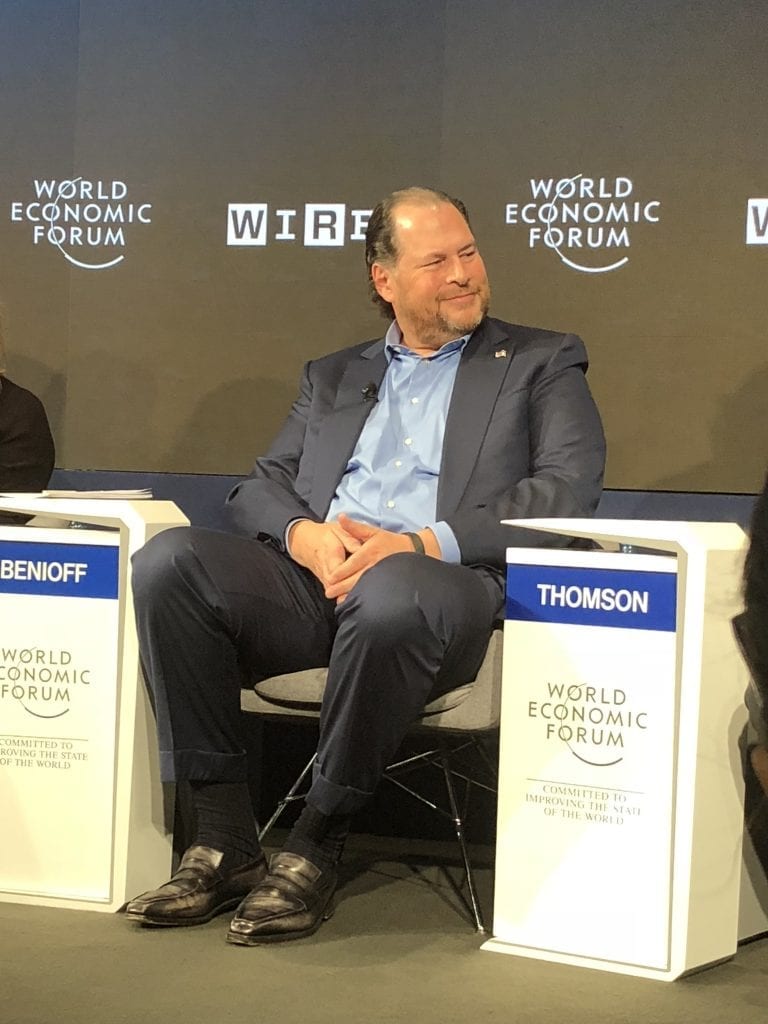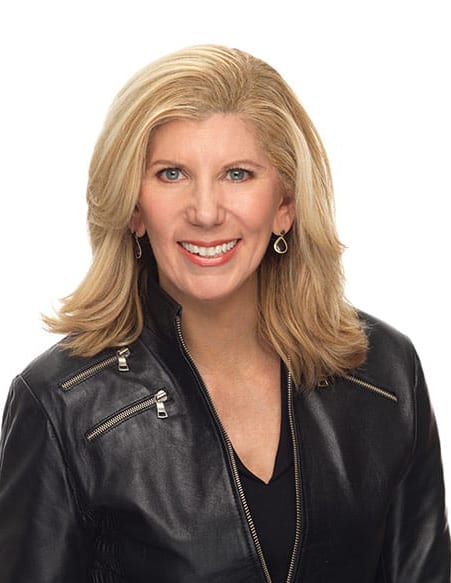
Salesforce CEO Marc Benioff at the World Economic Forum.
If you’ve read this blog before, you will have heard me talk about the impact of A.I. Unsurprisingly, A.I. remains one of the biggest topics of conversation at the World Economic Forum this year. But what has struck me is a recurring theme of transformation. A.I. is no longer something for the tech industry to consider – it is infiltrating our entire way of life, from self-driving vehicles, to healthcare, to the analytics tools we count on for developing influencer marketing programs. It is transforming the very nature of industries, and we all need to learn to adapt as A.I. takes its rightful place in the mainstream.
This week in Davos I have been intrigued by this theme of transformation – in sessions as diverse as healthcare technology, economic issues and the future of work. Here are a few key takeaways…
1. When it comes to healthcare, speed and efficiency literally saves lives.
Centene Corporation CEO Michael Neidorff discussed the practicality of using A.I. to quickly and effectively analyze data, leading to healthier patients and ultimately reduced costs. He stated that current A.I. platforms have the capability to review a million files in under five minutes – a feat that is unimaginable using simple manpower. Pfizer’s (client) Albert Bourla noted that with the human genome project, there are more than three billion DNA genomes, so it is impossible to sort through them without the use of technology. However, once we are able to correlate specific genes that are responsible for health issues, we can introduce proactive and reactive wellness programs to mitigate those risks and even cure diseases. Nokia’s (client) CEO Rajeev Suri said his company is working on wearable sensory devices that regularly tracks indicators like blood pressure and glucose and can be shared with doctors between checkups. In the near future, he believes similar devices can identify biomarkers that give early detection for cancer and other diseases.
2. Eliminating “routine” jobs will allow us to focus on what really matters.
Sinovaton CEO Kai-Fu Lee discussed how common jobs like receptionists will be replaced by automation, while others will utilize machines more regularly, such as the use of A.I. tools by doctors and lawyers. While some jobs will be lost, he shared an anecdote about working long hours and how he never really “turned off,” until he was diagnosed with cancer and had to reprioritize his life. He noted that while routine jobs dominate our lives, our work ethic is not really based on achieving tremendous client results but on wealth and financial success. If we take routine jobs out of the equation, it will allow us the time to figure out our true purpose and passion. He implored those in the room to think through the lens of, “How will A.I. help us be better humans?”
3. A.I. augments and enhances human intelligence.
In a session called “Future Shocks: Rogue Tech,” Salesforce CEO Marc Benioff gave an example of a very practical application of how A.I. helps him determine how to run his company. Salesforce uses A.I. to analyze large databases containing years of company data, and every Monday Benioff holds a meeting to review the analysis. He uses an A.I. system called Einstein that takes part in the weekly meetings, and Benioff asks Einstein what he thinks. “He does not hide things from me, and he always finds things I did not see.” He referenced a specific example that predicted one executive in Europe would not meet his projections, which allowed the company to course correct while there was still time to do so.
4. Our profession will continue to thrive as other fields are threatened by A.I.
It’s likely that A.I. will change elements of every single career, but some will fare better than others, said Sinovation’s Lee. Over time, pieces of all jobs will be done by machines. But there are four main skills that cannot be replicated by machines: complexity, dexterity, empathy, and creativity. This means it will be more challenging to replace human jobs like plumbers, artisans and marketers, which is good news for us. JPMorgan Chase (client) CEO Jamie Dimon echoed this belief, stating, “Marketing is not guessing. It is analytics, data, A.I. – it’s an absolute machine. But at the end of the day, it’s about people and their insights.” This is our core belief at Ketchum as well – there is proof in numbers, and we arm our clients with strategies backed by data. But the real value we bring is our people and their ability to combine the pure facts spelled out by the data with the creativity and strategic thinking that only an experienced human can bring.
A.I. has, and will continue to be, a major topic of conversation at the World Economic Forum and other gatherings of world business leaders. Since I first attended Davos in 2012, A.I. has become so much more than a buzzword – it is beginning to proliferate so many elements of our lives. The pace at which it has evolved is astonishing, and the truth is we don’t fully understand all of the implications it will have in the future. But as Jamie Dimon reminded us, this process is not new, “Technology has been changing the world since mankind has been here.”



